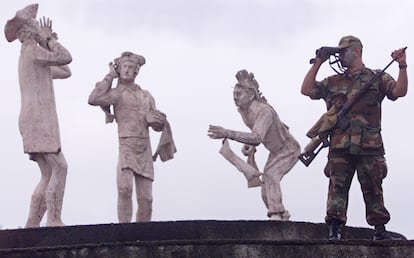The ‘North Koreanization’ of Ortega’s Nicaragua
New restrictions are being imposed on travelers with cameras and binoculars as the regime attempts to restrict reporting on the repression

On January 16, Nicaragua’s General Directorate of Customs imposed restrictions on travelers entering Nicaragua with cameras, photographic lenses and night vision binoculars, making them subject to confiscation for violating regulations. The measures were adopted after the surge in foreign reporters and documentary filmmakers publicized the increasing repression since 2018 by the Daniel Ortega-Rosario Murillo regime.
“This could be called the ‘Koreanization’ of Nicaragua,” said exiled former legislator Eliseo Núñez, referring to Kim Jong-un’s draconian dictatorship in North Korea. “This goes beyond what the Cuban and Chinese regimes do to tourists... Its purpose is to shield Nicaragua from prying eyes. The ban on cameras may sound futile given all the cellphones with cameras, but the regime doesn’t expect ordinary visitors with cellphones to spend all their time hunting for photos and information. But it’s stunning how they are closing off the country.”
The Sandinista regime justified the ban on night vision binoculars on the grounds that this equipment is for the “exclusive use” of the Nicaraguan Army and National Police, two institutions accused of using firearms to suppress protestors. “Confiscated binoculars without a permit issued by the National Police and that have not been reclaimed by the traveler within three months of confiscation will become the property of the National Police,” stated the new regulation.

The new regulation allows tourists to enter the country with “one photographic device and one device for long-distance viewing… Quantities in excess of those allowed will be subject to applicable import duties and taxes.” However, sources who deal with Nicaraguan customs claim that the Sandinista regime will not use this law just to collect tax revenue, but “for political purposes to hamper the work of journalists and documentary filmmakers.”
The new customs regulation includes a long list of camera models, video/film cameras and other viewing devices that cannot be brought into Nicaragua. The country has suffered a significant drop in international tourism since the ongoing socio-political crisis erupted into violence in 2018. Tourism has long been a significant sector of the economy, but so far private tourism promotion offices and businesses offering birdwatching and photo adventures have declined to speak out against the ban.
“The customs department communiqué includes a very detailed list of photography and film equipment made by leading companies like Canon, Sony and Nikon. Most importantly, the banned devices are high-end equipment designed for professionals that most ordinary tourists won’t have because it’s very expensive,” said Carlos Herrera, one of Nicaragua’s most well-known photojournalists. “This measure is another tool for censoring journalists and documentary filmmakers who are reporting on the climate of repression in the country.”
A former Ortega-Murillo daughter-in-law in charge of issuing permits
A tourist or traveler desiring to enter Nicaragua with “professional or amateur” cameras or filming equipment must obtain a permit from the National Film Archive, which is currently headed by Idania Castillo, a former daughter-in-law of the presidential couple who remains very close to Vice President Rosario Murillo. In 2018, during the height of police and paramilitary repression of citizen protests, Castillo was responsible for handling requests from the international news media and communicating official statements from the presidency.
Castillo, who was once married to Daniel Ortega and Rosario Murillo’s son, Juan Carlos, has become increasingly influential in the presidential couple’s hermetic inner circle. In October 2022, when the National Assembly reformed the National Film Archive’s charter, it expanded the institution’s authority to include oversight of all audiovisual and film productions made in Nicaragua. The new charter now requires domestic and foreign persons and entities engaged in cinematographic and audiovisual activities to register with the institution.
The autonomous National Film Archive has the authority “to prohibit the development, public exhibition and commercialization of cinematographic and audiovisual products, and may confiscate the same if they do not comply with this law.” Journalists and documentary filmmakers say this is another tool for muzzling creative freedom in response to critical reports on the regime’s intensifying strategy of repression, persecution and forced exile. When many Nicaraguan journalists were forced underground or into exile, a number of international journalists found ways to circumvent the country’s immigration controls to report on the persecution of dissident voices.
“In a way, we already had de facto restrictions on photography equipment,” said Herrera. “The new customs communiqué cites a law enacted in 2000 that was not consistently applied. But now the regime is using laws like this to control its own citizens... they are using laws created for other purposes to further their political objectives. Other countries don’t have these types of regulations controlling travelers with photography or film equipment. All you need to do is show that you use the equipment in your work as a photographer or journalist.”
Sign up for our weekly newsletter to get more English-language news coverage from EL PAÍS USA Edition
Tu suscripción se está usando en otro dispositivo
¿Quieres añadir otro usuario a tu suscripción?
Si continúas leyendo en este dispositivo, no se podrá leer en el otro.
FlechaTu suscripción se está usando en otro dispositivo y solo puedes acceder a EL PAÍS desde un dispositivo a la vez.
Si quieres compartir tu cuenta, cambia tu suscripción a la modalidad Premium, así podrás añadir otro usuario. Cada uno accederá con su propia cuenta de email, lo que os permitirá personalizar vuestra experiencia en EL PAÍS.
¿Tienes una suscripción de empresa? Accede aquí para contratar más cuentas.
En el caso de no saber quién está usando tu cuenta, te recomendamos cambiar tu contraseña aquí.
Si decides continuar compartiendo tu cuenta, este mensaje se mostrará en tu dispositivo y en el de la otra persona que está usando tu cuenta de forma indefinida, afectando a tu experiencia de lectura. Puedes consultar aquí los términos y condiciones de la suscripción digital.









































